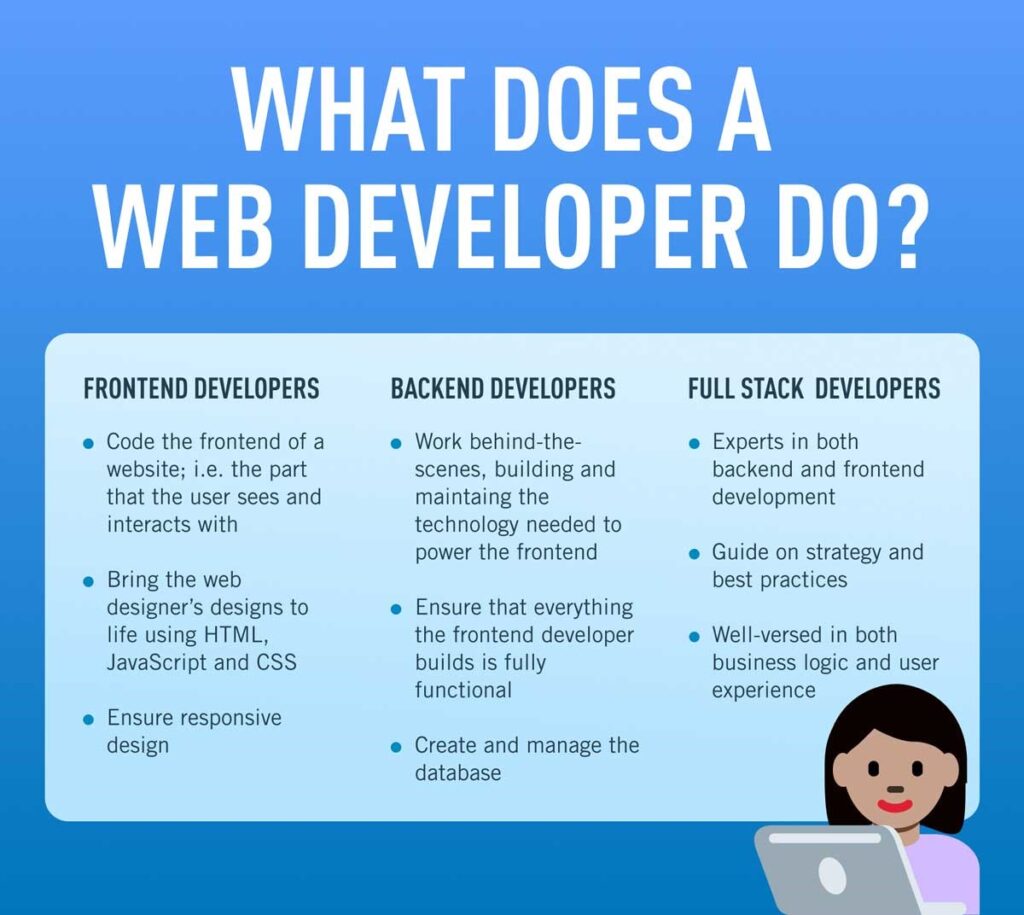
What is Web Designing?
Web designing is the process of planning, conceptualizing, and implementing the plan for designing a website in a way that is functional and offers a good user experience. User experience is central to the web designing process. Websites have an array of elements presented in ways that make them easy to navigate. Web designing essentially involves working on every attribute of the website that people interact with, so that the website is simple and efficient, allows users to quickly find the information they need, and looks visually pleasing. All these factors, when combined, decide how well the website is designed.
What Does a Web Designer Do (And How Do You Become One)?

A web designer creates the layout and design of a website. In simple terms, a website designer makes a site look good. They use design programmes to create visual elements and usually have expertise in user interface (UI), which means they strategically design a site that’s intuitive and easy for visitors to navigate.
Before talking about the skills or education needed, let’s uncover the daily tasks of a website designer so you can see if it’s something that suits your interests. Regularly, a website designer will:
- Design and layout websites
- Think through the navigation of a site to provide the best user experience
- Design sample pages and create mockups
- Create visuals, graphics, or animations
- Register web domains
- Organise files
- Update or refresh pages
- Coordinate with writers to create content
If your interest is piqued, let’s dig into this career and see what it takes to become a successful web designer. Course Link
What skills do you need as a Web Designer?
If you’re interested in becoming a website designer, there are certain skills you can develop to start down this career path. Here’s a look at both workplace skills and technical skills that you can expand on:
Workplace skills
- Communication: Website designers will need to talk with a company about what they want, ask questions about the intended audience, and convey their ideas for an effective site.
- Time management: As a web designer, you might decide to take a freelance approach where you work with many different companies at once or you might work for one company. Either way, you’ll need the ability to manage your time effectively to keep multiple projects moving.
- Collaboration: A website designer works with other people to create a site. You’ll need the ability to listen, collaborate, and take constructive criticism.
Technical skills
- Visual design: The core part of a website designer’s job is to create visual elements for a site, so a firm grasp of design principles is essential. This includes knowledge of design concepts and practices like proportion and symmetry, as well as typography and colour systems.
- User experience (UX) design: User experience describes how a person feels when visiting and using a website. The designer’s goal is to create a layout that’s easy to navigate and visually pleasing.
- Knowledge of design programmes: Website designers must be able to use design programmes like Adobe Creative Cloud, CorelDRAW Graphics Suite, or Inkscape. They rely on these programmes to create visual elements, produce mock-ups, and manipulate images.
- Some coding knowledge: A designer doesn’t write the code to make a site function, but it doesn’t hurt to know some HTML, CSS, or JavaScript in case you need to make slight adjustments to a site. With a basic understanding, you’ll be able to manipulate templates, enhance fonts, or move objects.
Do you need a degree to land a job as a website designer?
Many website designers have a bachelor’s degree or higher in fields like computer science, information systems, or engineering. However, earning a degree isn’t the only path to this creative career; you can earn a certification as well. The following sections look at both degree programmes and certifications.
What could I expect to earn as a web designer?
Salaries for Web Design jobs can vary from £15,000 to £40,000 per year depending upon experience and a person’s specialist skills set. According to IT Jobs Watch, the average current market salary for a junior web designer is £21,465 and for a senior web designer is £34,067 – a rise of 10.25% on the same period last year.

What are the career progression opportunities for Web Designers?
Many large public and private sector IT companies have in-house design departments. If working within such an organisation, a person can progress their careers by moving into design team management, or by expanding their current skill set to become a web developer, covering both web design and development.
Alternatively there are many web designer jobs within digital, advertising and creative agencies. You can work on a variety of projects within an agency, which gives good experience.
Finally a person can become a freelance designer. Although there is a lot of competition for contracts, the prospects for skilled web designers are good.
As an average daily rate, a web designer contractor can expect to earn up £265 per day.

Take the next step

Are you ready to take the next step toward building a career as a website designer? Learn more about the Web Design Professional Certificate on Global Technical Education. This completely online programme is designed to help individuals with no previous web design experience learn in-demand skills, all at your own pace. When you successfully complete the programme, you receive a sharable certificate to document your work.



